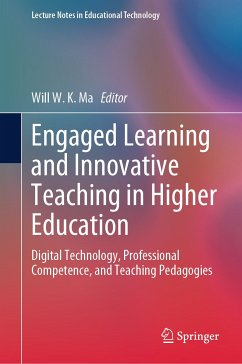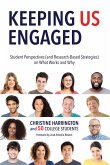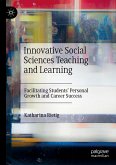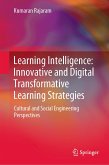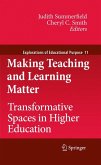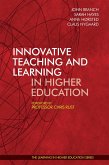Engaged Learning and Innovative Teaching in Higher Education (eBook, PDF)
Digital Technology, Professional Competence, and Teaching Pedagogies
Redaktion: Ma, Will W. K.


Alle Infos zum eBook verschenken

Engaged Learning and Innovative Teaching in Higher Education (eBook, PDF)
Digital Technology, Professional Competence, and Teaching Pedagogies
Redaktion: Ma, Will W. K.
- Format: PDF
- Merkliste
- Auf die Merkliste
- Bewerten Bewerten
- Teilen
- Produkt teilen
- Produkterinnerung
- Produkterinnerung

Hier können Sie sich einloggen

Bitte loggen Sie sich zunächst in Ihr Kundenkonto ein oder registrieren Sie sich bei bücher.de, um das eBook-Abo tolino select nutzen zu können.
This book presents research studies investigating innovative curriculum design, effective teaching pedagogies, skilling and assessment of relevant competencies, and innovative and learning-associated technology. The book is categorized into three sections: (I) innovative and digital learning environments; (II) assessment and development of future professional competencies; and (III) innovative curriculum design and teaching pedagogies. It serves as a useful resource for academic instruction in higher education. Employers, administrators, practitioners, postgraduate students, and postsecondary students in general will also find it informative.…mehr
- Geräte: PC
- ohne Kopierschutz
- eBook Hilfe
- Größe: 5.98MB
![Keeping Us Engaged (eBook, PDF) Keeping Us Engaged (eBook, PDF)]() Christine HarringtonKeeping Us Engaged (eBook, PDF)28,95 €
Christine HarringtonKeeping Us Engaged (eBook, PDF)28,95 €![Keeping Us Engaged (eBook, PDF) Keeping Us Engaged (eBook, PDF)]() Christine HarringtonKeeping Us Engaged (eBook, PDF)31,95 €
Christine HarringtonKeeping Us Engaged (eBook, PDF)31,95 €![Innovative Social Sciences Teaching and Learning (eBook, PDF) Innovative Social Sciences Teaching and Learning (eBook, PDF)]() Katharina RietigInnovative Social Sciences Teaching and Learning (eBook, PDF)97,95 €
Katharina RietigInnovative Social Sciences Teaching and Learning (eBook, PDF)97,95 €![Learning Intelligence: Innovative and Digital Transformative Learning Strategies (eBook, PDF) Learning Intelligence: Innovative and Digital Transformative Learning Strategies (eBook, PDF)]() Kumaran RajaramLearning Intelligence: Innovative and Digital Transformative Learning Strategies (eBook, PDF)89,95 €
Kumaran RajaramLearning Intelligence: Innovative and Digital Transformative Learning Strategies (eBook, PDF)89,95 €![Making Teaching and Learning Matter (eBook, PDF) Making Teaching and Learning Matter (eBook, PDF)]() Making Teaching and Learning Matter (eBook, PDF)73,95 €
Making Teaching and Learning Matter (eBook, PDF)73,95 €![Innovative Teaching and Learning in Higher Education (eBook, PDF) Innovative Teaching and Learning in Higher Education (eBook, PDF)]() Innovative Teaching and Learning in Higher Education (eBook, PDF)44,95 €
Innovative Teaching and Learning in Higher Education (eBook, PDF)44,95 €![Key Practices for Fostering Engaged Learning (eBook, PDF) Key Practices for Fostering Engaged Learning (eBook, PDF)]() Jessie L. MooreKey Practices for Fostering Engaged Learning (eBook, PDF)30,95 €
Jessie L. MooreKey Practices for Fostering Engaged Learning (eBook, PDF)30,95 €-
-
-
Dieser Download kann aus rechtlichen Gründen nur mit Rechnungsadresse in A, B, BG, CY, CZ, D, DK, EW, E, FIN, F, GR, HR, H, IRL, I, LT, L, LR, M, NL, PL, P, R, S, SLO, SK ausgeliefert werden.
- Produktdetails
- Verlag: Springer Nature Singapore
- Seitenzahl: 299
- Erscheinungstermin: 27. April 2024
- Englisch
- ISBN-13: 9789819721719
- Artikelnr.: 70574616
- Verlag: Springer Nature Singapore
- Seitenzahl: 299
- Erscheinungstermin: 27. April 2024
- Englisch
- ISBN-13: 9789819721719
- Artikelnr.: 70574616
- Herstellerkennzeichnung Die Herstellerinformationen sind derzeit nicht verfügbar.
